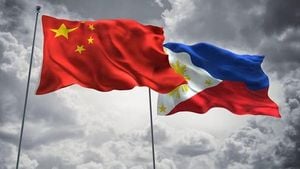Charles Kushner, known for his background as a real estate developer and for being the father of Jared Kushner, has been nominated by President Donald Trump to become the United States Ambassador to France. This appointment has raised eyebrows and sparked significant controversy, especially considering Kushner's past legal issues and the nature of his relationship with the former president.
Trump made the announcement via his Truth Social platform, touting Kushner as "a tremendous business leader, philanthropist, & dealmaker" who would be instrumental in strengthening the partnership between the United States and France, which Trump characterized as America’s oldest ally. Kushner's nomination follows his father's long-standing involvement with the Kushner Companies, the family’s real estate development firm.
For some, Kushner's potential ambassadorship is seen as symbolic of Trump’s tendency to appoint allies and relatives to key positions. His nomination also highlights concerns about nepotism and qualifications for such high-profile diplomatic roles. Critics argue Kushner’s checkered past, which includes serving time for federal tax evasion and witness tampering, makes him ill-suited for this position.
Charles Kushner was previously convicted for multiple counts, including tax evasion and making illegal campaign contributions. His legal troubles stem from actions taken against his brother-in-law, who he suspected was cooperating with federal investigators. This led to the notorious incident where Kushner hired a prostitute to lure his brother-in-law and filmed the encounter to send it to his sister, the man's wife. Following these incidents, Kushner received a prison sentence but was pardoned by Trump just before the latter left office.
While President Trump regards Kushner as a man of "high character," former New Jersey Governor Chris Christie, who prosecuted Kushner, has condemned his actions, branding them as "one of the most loathsome, disgusting crimes" he ever dealt with. This split between perspectives adds to the controversy surrounding Kushner’s nomination.
The reaction to Kushner's nomination has been overwhelmingly negative across various platforms, with many commentators and social media users questioning the ethics of appointing someone with such a problematic background to represent the U.S. on the world stage. One commentator described it as "utterly indefensible" to allow someone with Kushner's history to enjoy what could be viewed as a "taxpayer-funded vacation" to Paris.
The concerns extend beyond Kushner’s record; they also touch upon the broader implications of such appointments and what it signals about the priorities of the Trump administration. With Trump’s previous ambassadorships often filled with individuals with strong business ties rather than diplomatic backgrounds, this move seems to follow the same trend of cronyism. This perspective is echoed by those observing the increasing trend of political appointments favoring personal relationships over merit.
Further complicate the situation is the perspective of international observers. Reports indicate concern from French citizens and political commentators over Kushner's nomination. His connection to Trump and the controversial nature of his prior convictions raise alarms about how he would be perceived as a representative of American interests abroad.
During Trump’s first term, the position of U.S. ambassador to France was held by Jamie McCourt, who had a business background but was perceived as more traditionally qualified for the role. The shifting dynamic back to appointing personal allies may signal how the administration intends to approach foreign relations and diplomacy moving forward.
Historically, the U.S. has maintained ambassadorships as positions requiring significant political, diplomatic, or cultural engagement with the host nation. Critics argue appointing Kushner undermines the seriousness of this role, potentially aliening major European allies, especially as political tensions linger between the U.S. and European nations concerning various policy issues.
Rumblings of dissent within the Republican Party itself arise, with some members cautioning against Kushner's nomination due to its potential fallout. Given his history, there is fear it could provoke backlash or turn heads within the French government.
Supporters of Kushner and Trump, meanwhile, assert his experience with international business could bring added value to his role. They argue this experience would allow Kushner to handle diplomatic issues effectively, blending business acumen with political insight.
While Kushner’s supporters vouch for his ability to forge deals and create alliances, critics remind everyone of his criminal past. The future of this nomination—and what it signals—will likely come under intense scrutiny from both sides of the aisle as the confirmation process proceeds.
Overall, the nomination of Charles Kushner encapsulates the larger tensions surrounding Trump's administration, particularly tensions between traditional political norms and the reality of personal influence. With confirmation hearings on the horizon, many are left asking how the Senate will respond to these challenges, as they weigh Kushner's merits and past against the expectations of American diplomacy.



